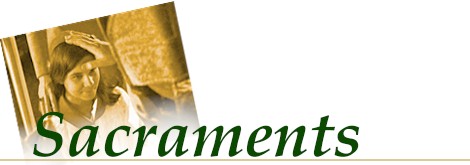p
From
the Catechism of the Catholic Church...1213 Holy Baptism
is the basis of the whole Christian life, the gateway to
life in the Spirit (vitae spiritualis ianua),[4] and the
door which gives access to the other sacraments. Through
Baptism we are freed from sin and reborn as sons of God;
we become members of Christ, are incorporated into the
Church and made sharers in her mission: "Baptism is
the sacrament of regeneration through water in the
word."[5]. To learn more about Baptism, see the Catechism of the Catholic
Church or
the Catholic Encyclopedia.
From the Catechism of the Catholic Church...1422 "Those who approach the sacrament of Penance obtain pardon from God's mercy for the offense committed against him, and are, at the same time, reconciled with the Church which they have wounded by their sins and which by charity, by example, and by prayer labors for their conversion."[4]. To learn more about the Reconciliation, see the Catechism of the Catholic Church or the Catholic Encyclopedia.
From
the Catechism of the Catholic Church...1285 Baptism, the
Eucharist, and the sacrament of Confirmation together
constitute the "sacraments of Christian
initiation," whose unity must be safeguarded. It
must be explained to the faithful that the reception of
the sacrament of Confirmation is necessary for the
completion of baptismal grace.[88] For "by the
sacrament of Confirmation, [the baptized] are more
perfectly bound to the Church and are enriched with a
special strength of the Holy Spirit. Hence they are, as
true witnesses of Christ, more strictly obliged to spread
and defend the faith by word and deed."[89]. To
learn more about Confirmation, see the Catechism of the Catholic
Church or
the Catholic Encyclopedia.
From
the Catechism of the Catholic Church...1322 The holy
Eucharist completes Christian initiation. Those who have
been raised to the dignity of the royal priesthood by
Baptism and configured more deeply to Christ by
Confirmation participate with the whole community in the
Lord's own sacrifice by means of the Eucharist.
From
the Catechism of the Catholic Church...1601 "The
matrimonial covenant, by which a man and a woman
establish between themselves a partnership of the whole
of life, is by its nature ordered toward the good of the
spouses and the procreation and education of offspring;
this covenant between baptized persons has been raised by
Christ the Lord to the dignity of a sacrament."[84].
To learn more about Matrimony, see the Catechism of the Catholic
Church or
the Catholic Encyclopedia.
From
the Catechism of the Catholic Church...1499 "By the
sacred anointing of the sick and the prayer of the
priests the whole Church commends those who are ill to
the suffering and glorified Lord, that he may raise them
up and save them. And indeed she exhorts them to
contribute to the good of the People of God by freely
uniting themselves to the Passion and death of
Christ."[97]. To learn more about Anointing of the
Sick, see the Catechism of the Catholic
Church or Catholic Answers.
From
the Catechism of the Catholic Church...1536 Holy Orders
is the sacrament through which the mission entrusted by
Christ to his apostles continues to be exercised in the
Church until the end of time: thus it is the sacrament of
apostolic ministry. It includes three degrees:
episcopate, presbyterate, and diaconate. To learn more
about Holy Orders, see the Catechism of the Catholic
Church or
the Catholic Encyclopedia.
Please contact our Pastor for information about RCIA (Rite of Christian Initiation of Adults), visitation, or Funeral Rite. .
home | visitor guide | staff & committees | sacraments | news & events | scriptures prayer intentions | welcome | jubilee 2000 | resources | guestbook | e-mail |

